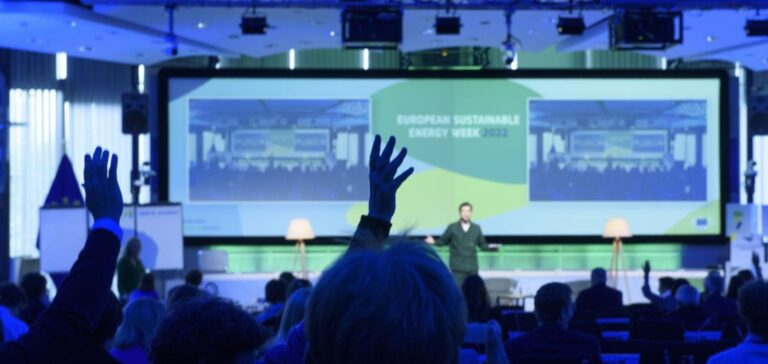The European Commission announces the opening of registrations for the EU Sustainable Energy Week (EUSEW) 2023. Under the theme “Accelerating the Clean Energy Transition – Toward Lower Bills and Increased Skills,” the event will be held June 20-22, returning to the traditional June.
EUSEW is the largest annual event dedicated to renewable energy and energy efficiency in Europe, featuring a series of activities aimed at building a sustainable and secure energy future for Europe.
A hybrid format
Like last year, EUSEW 2023 will be organized in a hybrid format, both online and in person. Participants are invited to register and can choose to join the event on site at the Charlemagne building in Brussels, or online, to participate in discussions on various topics related to the overall theme.
By 2022, the event had welcomed more than 8,000 on-site and online participants, including public authorities, energy policy experts, private companies, NGOs, EU project partners, researchers, youth and consumers. This year’s event is expected to attract similar participation.
Highlights of EUSEW 2023 include:
EUSEW Policy Conference, June 20-22. Key topics include skills for energy transition, energy efficiency, renewable energy, accessibility and inclusion, decarbonization policies and international cooperation. 60 sessions are organized by the European Commission and energy stakeholders and include high-level speakers to discuss, debate and share best practices.
The prestigious EU Sustainable Energy Awards ceremony on June 20, in the presence of EU Energy Commissioner Kadri Simson, recognizes individuals and projects for their outstanding efforts in four categories: Innovation, Local Energy Action and Women in Energy. In addition, a young energy champion will be named in recognition of their achievements.
The fourth edition of the European Youth Energy Day, on June 20, which includes a World Café of 30 young Europeans and a session dedicated to energy communities.
A series of networking events throughout the week, where attendees can connect with others in the sustainable energy community, including an Energy Fair (offering organizations and associations the opportunity to showcase their initiatives and interact with attendees).
And, from April to the end of June, locally organized Sustainable Energy Days are held around the world to promote renewable energy and energy efficiency.
Launched in 2007 by the European Commission, EUSEW is organized by the Climate, Infrastructure and Environment Executive Agency (CINEA) in close collaboration with the Directorate General for Energy.





















